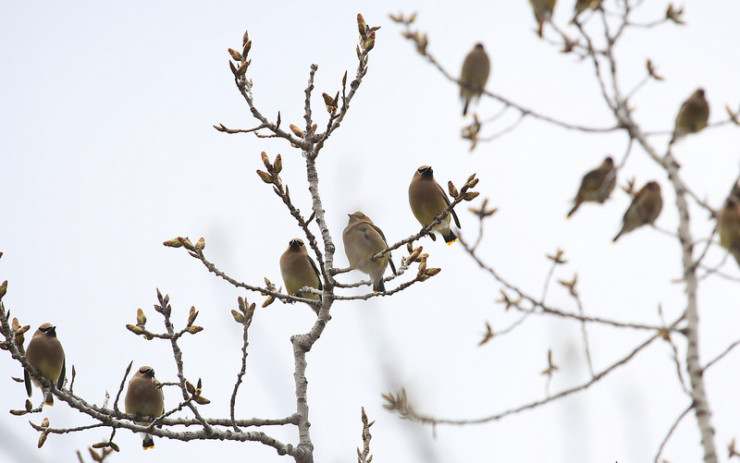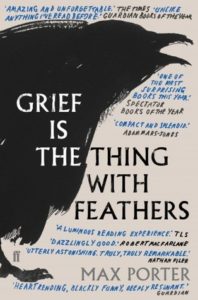
Is Grief Is the Thing with Feathers by British writer Max Porter a novel, a collection of poems, both a novel and poetry, neither one, or some new literary genre we haven’t seen before?
It’s officially classified as a novel, but it doesn’t read like any novel I’ve read before. It moves, jumps, shifts, and occasionally leaps between three narrative voices—Dad, Boys, and Crow.

It doesn’t follow a straight narrative line. It does follow a kind of thematic line. That thematic line is grief, the grief involved with the loss of a wife and mother. It’s no surprise that Dad is more aware of grief than the twin boys; he’s a bit of an “overthinker” and an intellectual type, and they are, well, just boys. And Crow? Crow is that creature with feathers and a smart mouth and a keen insight. He represents the black presence of grief in a family that’s been upended.
I like Crow. Crow knows his place. He knows he has a job to do, and when it’s done, he’ll leave. He leaves feathers on pillows and scattered around the family’s flat. Crow sometimes feels persecuted, and he talks about the hundreds of memoirs he’s written. He tells stories that begin with “Once upon a time.” He watches over the boys.
The boys go on about their business of being boys. They know they’ve lost their mother, and they miss her, sometimes terribly. But in some odd way they know things will eventually right themselves. Here’s one of the “chapters” in this “novel.”
Boys

Max Porter
Once we were doing some drawing at
the kitchen table and Dad said, ‘We
can never think too much about how
important Picasso is,’ and my brother said,
‘Wankerama, Dad!’ and Dad was nearly
sick from laughing so hard.
We abused him and mocked him because it
seemed to remind him of our Mum.
Once upon a time we went to a secret
place with our Gran. It was a huge semi-
circular wall of red sand that was once in
the sea. Give it a kick and a shell would
fall out. This was in the middle of a bright
yellow rapeseed field.
Dad did not come. That was something
Dad had nothing to do with.
Grief Is the Thing with Feathers is crazy, mesmerizing, fascinating, and creative, not to mention being one of the most unusual novels you might come across. You’re well hooked into it by the time you figure out that Crow represents grief, and that Crow is not only necessary and important but ultimately a good thing for this stricken family. A very good thing.
This is Porter’s first book. He is executive director of the literary magazine Granta and Portobello Books and lives in south London with his family.
Published in Britain in 2015 and the recipient of a number of awards and recognitions, Grief Is the Thing with Feathers is one remarkable novel—uh, poetry collection—um, something.
Related:
Max Porter is interviewed by Electric Literature
Porter reads from Grief Is the Thing with Feathers
Photo by Seabamirum, Creative Commons, via Flickr. Post by Glynn Young, author of the novels Dancing Priest, and A Light Shining, and the newly published Dancing King, and Poetry at Work.
__________________________

“I require all our incoming poetry students-in the MFA I direct-to buy and read this book.”
-Jeanetta Calhoun Mish
- Poets and Poems: Sandra Marchetti and “Diorama” - April 24, 2025
- Poets and Poems: Christina Cook and “Roaming the Labyrinth” - April 22, 2025
- Longfellow’s “Paul Revere’s Ride”: Creating a National Legend - April 17, 2025
Maureen says
Initially on reading this I thought it strange. And it is, because grief itself is strange, and so that structure Porter uses mirrors it, showing us grief’s many sides. Grief is not, despite the popular – and misunderstood – concept, a process (a term I so dislike to explain away loss.) It can be every feeling at once or something singularly overwhelming in recognition of loss. (For years I could hear my late brother’s voice and then one day realized it was no longer with me.) And when it passes, which it inevitably does, it lifts, like Crow, a bird that eventually won’t be needed but first teaches us grief’s ways. We don’t ever forget , we push the memories down into our heart, because we – the left-behind – have to go on living. As those boys do. There’s a reason God gave us a heart, a phenomenal muscle.
I’ve come to see the entire book and its structure and many literary facets as a wonderful metaphor.
Megan Willome says
I’m putting this one on my list. Thanks, Glynn.
Michele Morin says
Fascinating! I’m really drawn in by the perversity of the title.